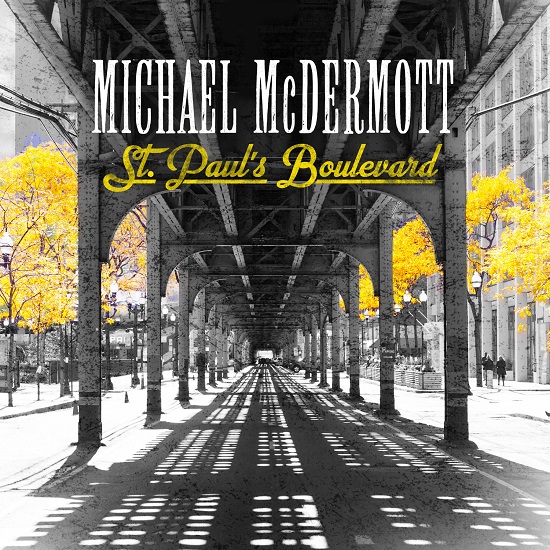
Michael McDermott isn’t making life easy – every year he releases an album (sometimes even two) that grabs your attention immediately with quality of the songwriting, the quality of the playing and arrangements, and the sheer variety of influences from the classic American pop/rock songbook. The difficulty lies in trying to think of something new to say about this steady sequence of excellence. There are some easy comparisons to make, but when all of those have already been made, it’s a challenge to know where to go next. I guess it’s safe to say that ‘St Paul’s Boulevard’ is a continuation of the winning sequence; it’s a classic album that would be huge if we still had a significant market for albums.
There’s a narrative running through Michael’s work since The Westies ‘Six on the Out’ of degradation, recovery and redemption. ‘St Paul’s Boulevard’ feels like a postscript to that narrative, looking back to the lowest of times with clear-eyed detachment and looking forward to the future with technicolour optimism. As you would expect from a Michael McDermott album, ‘St Paul’s Boulevard’ is packed with historical, geographical, mythological, literary, biblical and popular culture references, particularly ‘Marlowe’ which is a nod in the direction of Deacon Blue’s ‘Real Gone Kid’ and a tribute to Raymond Chandler’s sleuth Philip Marlowe.
The arrangement of title song is a slow builder; the ambient intro with slide and piano gradually fills out into a full band sound as the various characters in the story make their brief appearance. The Boulevard is that place we have in our history that’s full of possibility for triumph or tragedy; the place where we met characters that would have positive and negative impacts on our lives. There are a few references to heroes on the album and the most telling is probably in this song: “None of the heroes around here have capes, they’re just talking in taverns and on fire escapes”.
Michael McDermott isn’t afraid of throwing in musical or lyrical references; ‘Where the Light Gets In” has a hint of Coldplay’s ‘Higher Power” and the obvious Leonard Cohen reference, while there’s plenty of chiming guitar in Byrds/Tom Petty/Flaming Groovies style. While we’re on the subject of guitars, a true master of the fretted stringed instrument plays on the album and any project featuring Will Kimbrough is going to be good; he plays guitar, mandolin and banjo across the album.
‘St Paul’s Boulevard’ is another powerful Michael McDermott album that blends musical references from folk, soul, country, rock and other areas to produce an album that looks back to difficult times but also looks forward with optimism (“Peace, lave and brilliant colours to you all”). It’s a celebration of this moment and the moments to come.
‘St Paul’s Boulevard’ is out now on Pauper Sky Records (PSR010).
Here’s the video for the album’s final track, ‘Paris’:
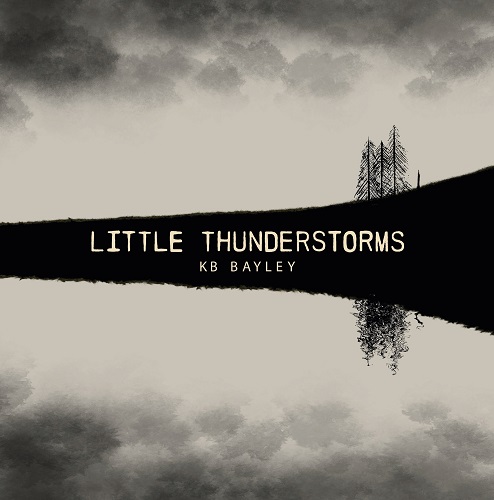
The opening line of the press release for “Little Thunderstorms” introduces KB Bayley succinctly: ‘Guitar player, songwriter, composer. Lover of wood, steel, valves and song.’ It’s good as far as it goes but it’s far too modest; there are a few superlatives missing in the first sentence for a start. KB’s a stunningly good player who knows what to play (and what not to play) to accompany his vocal. There’s quite a list of musicians playing on the album, but none of the arrangements feel cluttered as the players are used sparingly to create moods and atmospheres, such as the melancholy pedal steel on “Throw It in the River” and the muted trumpet three-in-the-morning jazz club feel of “Night Dogs”.
The songwriting’s powerful and personal and it’s obvious that KB has a keen interest in the art of the song and great writers. “Night Dogs” in name and arrangement is a nod in the direction of Tom Waits, while the album’s opening song “Cold Rain” turns around Leonard Cohen’s line from “Anthem” to ‘someone said there’s a hole in the sky where the night gets in’. Despite KB’s reputation as a session guitar player, the songs aren’t dominated by guitar gymnastics; they’re individual works of art where the words, melody and instrumental backing work together to evoke strong feelings and sometimes painful memories.
“Blood Red Lullaby” aside, with its initial setting in Dallas and JFK reference, “Little Thunderstorms” is a very British album, packed with references to the north-east of England, where KB grew up, and the south coast where he now lives. The sea and the shore are the constants that will always pull us back regardless of how far we leave them behind, and the little thunderstorms are the things that happen to us between leaving and finding our way home again.
Almost inevitably for a touring musician, there are a couple of road songs, the laid-back jazz of “Night Dogs” telling the ‘same hotel, different town’ story, while “Time to Leave Town” is the ‘same partner, different town’ story. Of the album’s eleven songs, there are nine originals plus Jeffrey Foucault’s “Cheap Suit” (a beautiful song about the persistence of a dream that hints at passing the dream to the next generation) and a slide resonator version of the traditional “Wayfaring Stranger (Redux)” that has echoes of Mark Knopfler’s acoustic work – maybe it’s a Geordie thing.
“Little Thunderstorms” straddles the world of the seventies folk singer-songwriters (post-Judas era Dylan when you could use more than an acoustic) and the grittier sound of modern Americana where any mix of styles and instruments is acceptable, and encouraged. The songs are a potent mix of memories where the melancholy outweighs the happy and the vocal is just the right side of raw to pull out the emotion in each one. If that’s your thing (it’s certainly one of mine) then this is the perfect way to start 2021.
If you want a quote to sum up the quality of the writing and the album’s message, how about this: “someone wrote a sign saying ‘jesus lives today’, I look around, I think he moved away” from “Throw It In the River” (check out the video below as well).
“Little Thunderstorms” is released on Friday February 5th on CD, LP and download and streaming services.
 A producer, a photographer and two musicians walk into a pub. Sorry, there isn’t a punchline to this; it’s just what happened. A quick pre-Christmas beer with some music business friends to chew the fat; what do you think we talked about? As always with these semi-unplanned sessions something good came out of it. We’ll leave it to Graeme Wheatley, bass player and songwriter with the band Deep Blue Sea to tell the story, enhancing it with some music trivia. You might want to start this piece whenyou have about an hour to spare because it’s a bit addictive, especially after Riot Towers made a contribution,
A producer, a photographer and two musicians walk into a pub. Sorry, there isn’t a punchline to this; it’s just what happened. A quick pre-Christmas beer with some music business friends to chew the fat; what do you think we talked about? As always with these semi-unplanned sessions something good came out of it. We’ll leave it to Graeme Wheatley, bass player and songwriter with the band Deep Blue Sea to tell the story, enhancing it with some music trivia. You might want to start this piece whenyou have about an hour to spare because it’s a bit addictive, especially after Riot Towers made a contribution,
Sitting in The New Cross House pub the other night with Allan McKay (something that could very easily become habit forming), we were talking about his series of guest articles “High Fives” in Music Riot – sign up now if ya haven’t already!
I’ve written a few before and always like rambling on about whatever, so I was happy to quickly volunteer to write one for this Christmas – even before Allan gave me my first pressie of the year – even if I had no idea what to waffle on about.
We were with Iago Banet, a guitarist from a band that I’ve heard are not that bad and we were talking about a gig we did a few weeks ago. Our singer, Dre Smith, had lost her voice and we were doing the gig as a 3 piece – playing songs we’d never played before. I proudly boasted that I’d sang the entire lyric to “Blinded By The Light” by Brucie without a single rehearsal. Allan asked if I liked Manfred Mann’s version or the original best, then Iago reminded me that after 3 attempts we’d had to abandon “All Along The Watchtower” because I kept getting the first line wrong!!! Pride comes before…
Anyway, this conversation led to the topic of this High Five.
Five covers that I think are better than the original.
Only my opinion here – but when I got to thinking about it – there’s maybe 20 or 30 I could muse about. So, I thought I’d kick it off with two people who I consider to be un-betterable – but concede that in these two occasions, they are bettered.
Song 1
All Along The Watchtower – Bob Dylan – Jimi Hendrix
OK, if you know me at all, you may have heard me at sometime mention the name Bob Dylan. He’s the cat, the verbal acrobat-tery, the lyrical dexterity and temerity in all sincerity. A couple of weeks ago we were playing Bude R&B Festival, which involved a good 4 hour drive back and forth. Amanda Dal, our wonderful drummer, asked me, unprompted, to play the three albums Bob recorded in 1965 that “invented Rock Music as we know it”. Much to Iago’s horror. So we had a great journey back and forth listening to Bob. It’s Amanda’s turn next, so I am going to get 4 hours of singer songwriter LP. The fact that she’s a ringer for Bob makes me favourable disposed to her from the get go – so – I’m ok with this!
Anyway, some people say (fools that they are) that any cover of a Bob song is going to be better than Bob’s version. BUT THEY ARE WRONG!!!! This has only ever happened once in the whole wide universe since the beginning of time. And only one person could a done it. Jimi. Y’know, I’d love to be able to wipe the tape and hear Jimi’s version of Watchtower again for the first time. Can you remember that moment? I can’t. But listen to it now. The swagger, the invention, the sass, the sheer coolness. Four minutes of perfect cool. If Jimi hadn’t recorded it, would we remember the original? Was it just a fairly average track on a subdued and pared back album from Bob who might have been wondering at the time where he was going next. Recorded in 1967 after the “fall” it was a total turn away from the more blues inspired electric albums and a return to his more folkie side, but Jimi took this track, rocked it up, funked it up and delivery to my mind one of the greatest little guitar pop songs of all time.
Oh, BTW, the title of Bob’s album, John Wesley Harding. It was named after a Texan outlaw of that name – only they spelled it wrong!!! He was called John Wesley Hardin.
Compare and contrast:
Song 2
Nothing Compares 2U – Prince – Sinead O’Connor
I was a big Prince fan. Still miss the guy. He might have had demons and might have been just a tad obsessed but look at the catalogue of pop songs. Inventive, fun, joyous, rude, rock and raunch and lovesexy. He made pop a bit dangerous, a lot of fun and a lot of cool – combined a bit of Jimi, a bit of Marc, a bit of James Brown and a lot of genius. Until Sinead covered this song I would not have thought anyone could touch the little chap at his own game. I kinda thought Prince songs were indelibly stamped with Prince’s logo. You can’t touch this….
I wuz wrong. The frailty and fragile nature of the song fits Sinead and both somehow meld. She is the song, the song is her. That just doesn’t happen very often – if at all. That revolting phrase “you owned it” churned out on brain dead TV talent shows ad nauseam for once applies. You can’t think of the song without thinking of Sinead and vice versa. They might be so entwined that it overshadows her career.
OK, that’s two down and just to sum them up, nobody else has done a cover of a Prince song better than Prince and ditto Bob. Argue away, I’m not listening.
Compare and contrast:
Song 3
With A Little Help From My Friends – The Beatles – Joe Cocker
This is weird. The Beatles FFS? The greatest band ever. The greatest song writing partnership of the 20th century. The band that wrote the book (and the sequel). Have you heard some of the covers? “Hey Jude, Hey Bing”? Trust me, it was an album. My dad had it. Can you imagine the scene in our house? He was a jazz musician and I think he made this one attempt to be down with his son. He’d spent some futile time trying to tell me that all of this pop music stuff was nonsense and real music would eventually come into its own and Benny Goodman, Duke Ellington et al would be on Top of the Pops (Pops in this case being hep cat chat for Dads). Suffice to say most covers are cheesy in the extreme or just for shock value with nothing of value added. From Matt Monroe to Siouxsie Sioux. But, Joe? That voice. That presence. That simple honesty and stripped back truth. It’s a song, dare I say, that Paul didn’t really think was the Dog’s Bs so he suggested that Ringo sang it as a little bit of fun “What would you do if I sang out of tune?” and the whimsy fitted the feel of Sgt Peppers. But it was far from a stand-out track.
Now, fast forward a mere year or so. On stage at Woodstock and Joe says “the title of this song says it all”. The song is imbued with something more. A part of the hippy dream is captured in the performance. It’s a time piece. Oh and that voice? Come on. Just go have a listen. Band ain’t too bad either.
Song 4
Respect – Otis Redding – Aretha Franklin
Like Joe, this cover takes the song into places the original didn’t. Like the others too I guess. But with this one, you start pretty high up – with that voice, Otis. A voice that can quite easily make you cry. My Girl? Try A Little Tenderness? I Been Loving You Too Long? I’m tearing up now. And I’m a tough guy…
But Aretha takes a lyric that just might veer towards a bit misogynistic these days – y’know, man works all day – comes home to little lady cooking for him and expects a bit of R – E – S – P – E – C – T – and she makes it the first bona fide feminist mega hit defining moment of the decade. Oh yeah, and it was her major first hit after 10 years fighting against “the man”!!
What Aretha did changed the world. A cover version of a pop song changed the world? Yes, that’s what I said. Made a massive difference to the feminist movement and the civil rights movement. The impact of this little pop song can’t be ignored. That’s how deep my love is.
Oh, BTW, Otis didn’t really like the cover – but learned to live with it when the dosh rolled in – and also – listen to his version – most people think the lyric “R – E – S – P – E – C – T find out what it means to me” is part of the original.
Song 5
Girls Just Wanna Have Fun – Robert Hazard – Cyndi Lauper
For years I’d thought Prince wrote this especially for Cyndi. Someone told me some Fake News and I never questioned it. It’s a great song and it seemed believable. It’s my wife’s favourite “getting ready for Friday Night” song – so I had to include it for her.
There’s not a great deal to say about it other than, in Cyndi’s hands and voice, it’s perfect pop. In Robert Hazards? Well, have a listen to the song below. My main question is, How did Cyndi hear this very very average song and say “I can make this song a mega hit that will last generations and become Graeme’s wifes’ favourite “getting ready for Friday Night song” for all time”? I dunno the answer but one thing I will point out is, the song lasts 2 minutes and 30 seconds and the actual track lasts 4 minutes and 30 seconds. And by strange coincidence, when my wife says she’ll be ready in 15 minutes… you can fill in the rest.
Just before I trot off to have a mince pie, there were a couple of things I considered but rejected and hopefully some of these will incite you to invective 🙂
- Leonard Cohen covers – it’s easy to say other people sing them better than Lenny. That’s not the point. We can all say a photograph of a tree looks more like a tree than a Van Gogh painting of a tree. I don’t know where I’m going with that – other than Lenny is the Van Gogh of pop – funny, sad, dark, deep, tortured and Chaplinesque – there’s a crack in everything – that’s how Lenny gets in. I like his cracks. In his house there are many flaws – all of them interesting.
- Led Zeppelin – when you actually claim to have written all your covers yourselves – it doesn’t apply.
- Anyone covering Tom Waits with a gravelly voice – don’t be silly (Sir Rodney).
- Anyone covering Tom Waits with a lovely voice – as above.
- The Blues – it’s totally impossible to compare Crossroads – Robert Johnson to Cream. Both are wonderful in their own way – and I bet you can think of lots more examples. So, off you go, your challenge is now to name 5 blues songs that have brilliant originals and brilliant – but significantly different – covers.
Many thanks to Allan for allowing me to stop work for 3 hours to write this 🙂
Have yourselves a merry little Christmas, if the fates allow.
Cheers
Graeme
Written before the election December 2019 (I might not be in such a frivolous mood after that).
Sorry Graeme, but we need to have the last word here (not about the election, not even going there), especially after squeezing in two High Fives in one piece, but we did mention another song, which was a band covering their own song. Thin Lizzy’s “Nightlife” version of “Still In Love With You” should have pushed all the buttons as a duet between Phil Lynott and the wonderful Frankie Miller, but it was a bit of a mid-tempo plodder. Someone obviously worked out that it was a potential anthem, slowed it down, stuck a truly wonderful Brian Robertson solo in there and, voila, rock classic.
 Well, I’ll say this for him, he’s in good nick for 74. Then again, he has looked after himself.
Well, I’ll say this for him, he’s in good nick for 74. Then again, he has looked after himself.
Al Stewart played the first Glastonbury. He knew Yoko Ono before John Lennon. Paul Simon was his next door neighbour and he’s exchanged songwriting notes with Leonard Cohen. Born in Glasgow, raised in Dorset, went to London to seek his fortune and settled in LA when it all ‘worked out.’
He’s a strange hybrid, really. A product of the BritFolk boom of the late sixties following the obligatory dalliance with British Beat groups in the early sixties, he, almost accidentally, once he’d come out of contract with his first major record company, morphed into a ‘staple’ of American FM radio, a classic of the ‘yacht rock’ genre. His vocals lend quite a lot to the Graham Nash ‘razorthroat’ school of glass-shattering clarity and he wrote songs. Lots of them. And one of them, finally and irrevocably, cracked America – and indeed the world – wide open for him.
This tour is with Chicago’s Empty Pockets, acting as opener for the man himself and also as his ‘Band’. As an act in themselves they’re a pleasant listen, a bit soppy maybe for a cynical old BritBloke and despite some excellent electric piano and some guitar to relish, not entirely convinced about the male/female harmonies which seemed a little harsh at times.
However, as the ‘Al Stewart Band’, in effect, they proved to be just the ticket, a perfect compliment and support to one of Britain’s greatest living ‘Heritage’ songwriters.
An unmemorable first tune – disarmingly ‘fessed up’ to as such by Stewart who claimed nobody’s interested in the first tune anyway; they’re too busy seeing if you’ve got any hair left etc – soon gave way to a sumptuous “Flying Sorcery” which is a beautifully fresh, naïve-sounding song which just picks the listener up and sweeps them off. And straight away it’s pretty clear this won’t be a hair shirt fest – it’ll be a celebration of those radio-friendly specials which were beautifully produced and are just sumptuous.
This kicked straight into “Time Passages”; album title track and Billboard top ten hit single. Refreshing as an upland winter walk it was a gorgeous listen live with fabulous sax solos – which this song MUST have to work – and thick layers of wrap – around keyboards, this brought the house down, even this early in the set.
It isn’t all good news, though. This is the 20th gig of a 21-date UK tour. A big ask for a bloke in his mid-seventies and a band from Chicago who by their own admission were feeling seriously homesick. Not sure if this was the reason – or if age had just caught up with the vocal chords and squashed his range so he can’t quite reach those stratospheric upper octaves, I don’t know – but, and to an extent to his credit, he didn’t rely on the younger harmonies to cut in to sustain and ‘replace’ his voice, he just put his own voice out there and although on occasion this meant slightly strange harmonic arrangements to get through some songs, I didn’t spend the night cringing for him.
An early high point was “On The Border”, reached number 42 on Billboard and the ‘breakers’ in the UK (I’ve still got the demo 45 vinyl) with the spine-rattling bass intro and fiery Spanish guitar and as a listener you’re reminded of how timeless and relevant many of these songs still are. Somehow a song about the Spanish civil war throws light on Brexit (‘in the islands where I grew up nothing seems the same’, anyone?) Or Syria. Pick and mix your own analogy. A rich and fulfilling listen, by now he has the audience eating out of his hand, a relationship which he then cemented by responding to a holler from the audience for “Brooklyn”, an ‘old one’ from more folky times, which could only be played by himself and one band member as no-one else knew the song! Now there’s spontaneity…..
“Broadway Hotel” was the B-side of the UK “Year of the Cat” single and here the keyboards ‘roll’ beautifully. It’s just a great song about a sort of ‘accidental’ seduction.
“Almost Lucy” follows, another irresistible song from “Time Passages” which references in terms of content if not style, the early folk club days. By now I am truly in awe at how well this stuff is translating onto stage; but why should this be? He’s just played over 100 US and 20 UK gigs with this band, this body of work (with variations!) – you’d expect an experienced trouper like Stewart to nail this – and he does just that. Otherwise, and at the age of 74, why do this to yourself?
I always think it is asking for trouble, playing human jukebox to audience shouts, but he seems quite at home with this form of Russian Roulette, even when some Muppet yells out “Year of the Cat” (like, he’s really not going to play THAT one, right?) and settles on “Clifton in the Rain” which really is folky, whimsical stuff going back to the sixties. Bit twee for me, but, if that’s what floats your boat…..which segues into the vignette poem “Small Fruit Song” for a few seconds prior to the audience applauding warmly, as they had more or less all night. He really is Going Down Well.
The track before “Year of the Cat” on said album is “One Stage Before” and that’s the order they are dealt tonight. The latter is a troubadour song; the way an audience is seen by an artist – and it isn’t always as a bunch of woolly sweater wearers eating ice cream tubs, as it turns out. And it’s another great song, spiced up by some great guitar and keyboard work by the Empty Pockets.
Prior to the captivating keyboard intro to the main event, (otherwise known as the greatest FM airplay tune of all time and no, I am not exaggerating) Stewart tells us the story of “Year of the Cat”. Along with various English folkies and ex-folkies who had some success, (Steeleye Span, Incredible String Band, Insert Name Here), he’d been shipped out to the US and hadn’t gotten very far, as tended to be the way. And then he found himself opening for Linda Ronstadt, which was a great opportunity. It worked fine in the more liberal North and West, but they hated him with a vengeance in the southern states, where an eight-minute song about the Russians, introduced as a ‘Country and Eastern song’ very nearly got him killed. So he went off to invent something which might have a broader appeal…and found one of the band members messing about with a particular progression….which they then chucked just one note into, and then he wrote some enigmatic, seductive, shape-shifting lyrics…and after a whole lot of work by producer Alan Parsons, he came up with and again I say it the single best FM radio playlister, ever. Got to number five on Billboard, even got to number 31 in tone-deaf Britain where we were still transitioning from glam to punk, and it wasn’t a good look…and it eventually drove the album, and the follow-up album, platinum. Slow burner, but now almost every UK radio station playing AOR love songs will now feature this as a staple alongside Billy Paul’s “Me and Mrs Jones” and Fat Larry’s Band and “Zoom”. Serving Suggestion. His conclusion (elsewhere) that he’d decided once he’d heard the final mix that if this wasn’t a hit, he couldn’t write a hit, proved very astute and possessed of an understanding of self which most musicians don’t seem to value.
Any slight misgivings about the slight lack of flexibility and range in the vocals are quickly disarmed by the ferocity and style of the guitar solo, the fluidity and drama of the main sax break, and the percussive but wandering piano fills and frills. It isn’t perfect, you’d need a whole bunch of strings for that and a voice that hadn’t been lived-in for quite so long but on balance this was one of my favourite five musical minutes of the year so far.
Difficult to know how you’d ‘ace’ that for an encore but “If It Doesn’t Come Naturally, Leave It” (also from “Year of the Cat”) sounded like a fair call – described by Stewart as a ‘sort of Bruce Springsteen pastiche’ and being played like that tonight, it did the job well, especially when followed as a parting shot by a newish tune about growing old; ‘Getting out of the box that you made of your life….you’re young again!’ I’ll drink to that.
It’s fair to say the lad’s come a long way from Bournemouth. Soon after “Year of the Cat” broke out, he moved to LA to live – and stayed there. Cue the sneers? Well, you would, wouldn’t you? Al Stewart; well-travelled, intelligent, articulate and with a great sense of historical and artistic perspective, this elderly troubadour reaches parts other singer-songwriters can’t reach.
And thanks for “Year of the Cat”. You made me a lot of money playing a beautiful song to a lot of people a lot of times. And the wonder is, it never felt like it.
 Allan is a huge fan of Rod Picott. He loves the last two albums, “Fortune” and “Out Past the Wires”, he’s seen him live and was gutted to miss Rod’s latest appearance in London in the spring of 2018. Rod can sing and play with the best but, beyond anything else, he’s a storyteller; the characters in “Out Past the Wires” will be appearing in a volume of short stories in the near future. So it’s absolutely no surprise that Rod’s High Fives for 2018 are literary picks. He’s also very thorough, so he provided all of the cover artwork to use in this piece.
Allan is a huge fan of Rod Picott. He loves the last two albums, “Fortune” and “Out Past the Wires”, he’s seen him live and was gutted to miss Rod’s latest appearance in London in the spring of 2018. Rod can sing and play with the best but, beyond anything else, he’s a storyteller; the characters in “Out Past the Wires” will be appearing in a volume of short stories in the near future. So it’s absolutely no surprise that Rod’s High Fives for 2018 are literary picks. He’s also very thorough, so he provided all of the cover artwork to use in this piece.
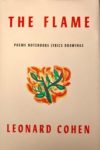 “The Flame” – Leonard Cohen
“The Flame” – Leonard Cohen
This is Cohen’s final piece of work and in fact he died before finishing. “The Flame” is a loose collection of poems, drawings and lyrics from his later albums. Most of the drawings are of Leonard himself with his aged and jowly face surrounded by small sometimes mystical phrases. The book is revelatory in showcasing the familiar syllabic repetition in much of Leonard Cohen’s work. It’s surprising to see the rhythmic patterns emerge over and over as they bring the reader to a sort of trancelike state. The familiar themes are all here. Love, loss, sex, death, aging and the mysterious relationship Cohen had to life itself. “The Flame” is a wonderful book and an intimate look inside one of the great artistic minds of the last fifty years.
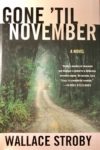 “Gone ’Til November” – Wallace Stroby
“Gone ’Til November” – Wallace Stroby
This noirish crime fiction novel grabs you from the beginning and Stroby masterfully drags the reader along into a fast-paced mystery that never lets up. This is not the kind of fiction I’m usually drawn to but the “Gone ’Til November” characters are so vivid and the story so compelling that I couldn’t put the book down. The plot unfolds much like a great film and is just as cinematic. Simply – great crime fiction worthy of Elmore Leonard comparisons.
 Substitute – Nicholson Baker
Substitute – Nicholson Baker
The genius of Nicholson Baker can’t be overstated. “Substitute” is a 719-page memoir of Baker’s tenure as a substitute teacher in the public school system of the state of Maine. Baker does something in his writing that is absolutely unique. He writes as a person’s mind works without any nod to plot and without any hint of manipulation. It is a wild and strangely compelling trick that keeps you wondering where his words will go next. There are untamed swings of thought that keep you on your toes the entire time. “Substitute” is basically every thought Baker had during his 28 days as an on-call teacher. Baker’s observations are so sharp and his empathy so present that this project is an incredibly moving journey through what should be incredibly pedestrian territory. In lesser hands this book would never work. A stunner.
 Paris Trout – Pete Dexter
Paris Trout – Pete Dexter
This novel is straight up my alley – dark southern gothic filled with vivid intense characters and rich brilliant prose. “Paris Trout” is simultaneously dark, violent and comic and the novel goes places you do not see coming. The main character himself is a racist, wife-abusing storekeeper in the dreamy small southern town, Cotton Point, Georgia. Dexter reveals our common flawed humanity through the townspeople’s reaction to a tragic incident brought on by Trout. Such vicious narrative requires a deft hand and Dexter never leaves the reader in doubt as he drags you into deeper and deeper water.
 Trampoline – Robert Gipe
Trampoline – Robert Gipe
This illustrated novel is a work of absolute genius. The narrative is so vivid that I can recall the story as if I have seen a film. That’s saying something. The book follows the life of wry, restless fifteen-year-old outsider Dawn Jewell. Woven into her story is a larger narrative that addresses the brutal nature of strip mining in her small Appalachian Kentucky town. Gipe’s own loose, scratchy inked illustrations are a marvel of economy and power. The drawings of Dawn are often accompanied by a few carefully chosen words that reveal her inner mind and the conflict therein. Your heart will break for Dawn as she navigates her small world and the inevitable collisions that come with her finding her way to some kind of peace inside the chaos around her. This book is a game-changer we seldom receive in fiction.
It’s the fourth day of the 2018 High Fives series and the contributions from songwriters and performers are starting to come in. it’s always good to have something from Graeme Wheatley, bass player and songwriter with Deep Blue Sea and all-round nice guy. It’s great to see that Graeme has completely embraced the High Five brief – just five of absolutely anything. And there’s even some Shakespeare for you as well. All photos courtesy of Laurence Harvey.
 What subject can I pick? Allan will have the gigs sewn up for sure. I think I did albums and musicians before. I guess my answer is easy – it’s what I am doing right at this very moment. Or rather, it’s what I should be doing – but I am letting Allan’s request for an article distract me. Song writing.
What subject can I pick? Allan will have the gigs sewn up for sure. I think I did albums and musicians before. I guess my answer is easy – it’s what I am doing right at this very moment. Or rather, it’s what I should be doing – but I am letting Allan’s request for an article distract me. Song writing.
I first thought I’d write a note about my favourite 5 songwriters – but none of them have written anything new this year – and it’s 2 years since Leonard decided to write no more. So I thought I’d write a little about some Deep Blue Sea songs – it might be self indulgent, it might be a bit arsey? But surely it’s not as bad as scoffing an entire tin of Quality Street tho of course, I might do that too.
2018 has been a year of writing songs. Deep Blue Sea started to write as a unit when Dre and Amanda joined Iago and me in March 2018. In the space of 3 months we got together, did a few gigs and then recorded a live album featuring 5 songs that were written in that 3 month creative burst. Since then we’ve probably written about 15 more and we’re in the studio over December and January recording them for a new album in 2019.
Seems like a good idea to take a look at the 5 songs we wrote over that 3 month period. I’m hardly qualified to go into great depth on the music – and the lyrics are totally open to interpretation – but here goes a few words of waffle and title tattle – feel free to disagree. One over-arching observation. A band is a relationship. Relationships start with an intensity. These songs happened fast and are part of the glue that we’ve created – part of the DNA of DBS. I hope you like this little tale –
“A tale told by an idiot, full of sound and fury, signifying nothing.”
Rock Star Status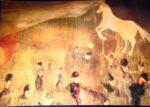
Oh. Look at the stars up in the sky – My oh my
Look at the stars waving goodbye – Bye bye bye
Everybody here gets Rock Star Status – There’s no point now cos everbody’s famous
It’s nobodys fault But everybody hates us – It’s nobodys fault But nothings gonna save us
Everybody here gets Rock Star Status – A little applause and admiration
15 seconds of adoration – A lethal dose of adulation
Oh. Look at the stars up in the sky – My oh my
Look at the stars waving goodbye – Bye bye bye
Everybody here gets Rock Star Status – A pocket full of dreams and a ticket to Vegas
Hold on tight, you’re making the papers – O/D-ed celebrities are coming back to plague us
Everybody here gets Rock Star Status – VIPs in the Palace of Gratis
Take a little taste of the breathing apparatus – A finger on the pulse of the phallic operators
Oh. Look at the stars up in the sky – My oh my
Look at the stars waving goodbye – Bye bye bye
All we ever wanted was Rock Star Stuff – Everything now and it’s still not enough
Keep it coming cos we’re Rock Star Tough – Keep it coming til we choke on the stuff
Oh. Look at the stars up in the sky – My oh my
Look at the stars waving goodbye – Bye bye bye
So, Iago had this little Stonesy type riff- except as always with Iago – the chords were weird, wired and inspired. I’d been to an art exhibition in Dulwich and there had been a painting I really liked. Couldn’t afford it of course, but there were some postcards of the painting free – so I took a couple. Got home later that day and looked at the picture. Surreal dreamscape with horses. Turned it over and the title was “All I ever wanted was Rock Star Status”. I knew I had a title. The lyrics flew onto the page – it was a job stopping them. When Dre started working on the melody she noticed nothing really rhymed very well. There’s the language barrier for you. You say Status and I say Status!!! We compromised. What’s it all about? You tell me. I’ve been wondering. Oh, by the way, the artist, Kate Pritchard, who painted the picture, came to see the band at our gig last week at 100 Club!!! Circle complete. That was a total new experience for us both – and a really good one. Life eh?
Manic Pixie Dream Girl
Dark days take pride of place – For the little girl with the smiling face
A smile that hides – uncertainty
If her face seems so serene – Her hands betray a silent scream
And doubts about – her sanity
Worlds of distorted noise – Distraction drinking drowning boys
Shaking shame – and regret
Touch and hold and then let go – Of something in her overcoat
One thing not – broken yet
The manic pixie dream girl is swaying in the breeze
Washed by winds and tossed by tides from all the seven seas
The manic pixie dream girl is shaking like the leaves
Crossed by stars and chained by dreams of
Never being free
Black clouds hang down the face – of the little girl with silent grace
Reaching out for – sanctuary
Beneath the stones and dusty bones – words are falling all alone
To mourn – dignity
Might have seen might have beens, hopes are only dusty dreams
Bitter pills – memory
Moments passed nothing lasts, out of reach fading fast
Time kills – vanity
The manic pixie dream girl is swaying in the breeze
Washed by winds and tossed by tides from all the seven seas
The manic pixie dream girl is shaking like the leaves
Crossed by stars and chained by dreams of
Never being free
She’s
Thrown in all directions – blown by recollections
The manic pixie dream girl is swaying in the breeze
Drawn to all confections – torn by rare infections
The manic pixie dream girl is shaking like the leaves
The manic pixie dream girl is swaying in the breeze
Washed by winds and tossed by tides from all the seven seas
The manic pixie dream girl is shaking like the leaves
Crossed by stars and chained by dreams of
Never being free
“I have almost forgot the taste of fears; The time has been, my senses would have cool’d To hear a night-shriek.”
Trev Turley writing a review of this song in Blues In Britain called the groove “invisible reggae” – I dunno what it means – but I like it 🙂
I was driving along in the old band van awhile back, listening to the radio. There was a book review programme on and people were talking and I wasn’t listening until someone said “oh, her, the classic Manic Pixie Dream Girl, it’s no more than you’d expect.” I knew I had a title for a song, but I didn’t know what the person meant by “no more than you’d expect.”
I got to thinking about a friend of mine who I am very happy to say is on the other side of the tunnel from her period as a manic pixie, but there was a time when several friends and I worried about this frail and beautiful butterfly. We saw her floating, we saw her shine and shimmer but we couldn’t do much to shelter her from the storms inside. She was fighting battles we had no weapons.
I wanted to try and capture the idea of a moment in time with her – where words don’t always mean what they appear to mean, where things tail spin off into other moments – the uncertainty at the core of a person in turbulence. I’m so glad she’s still my friend. And in the weirdest ways the manic pixie dream days are not over but no longer laced with the threat of a long, long night.
The Thrill of It All
The little girl doesn’t know
If she’s alive anymore
No sense of fun – nowhere to run
Once there was a time
Happiness was no crime
Now she’s in a cage – No passion or rage
As the light starts to fall
She’s walking on the edge
Of everything unsaid
It hurts just to feel, doubt what is real
Standing by the side
Of the days of her life
See the falling tide – what’s left behind?
As the light starts to fall
I know she recalls – I know she recalls
I know she recalls – The thrill of it all
I know she recalls – I know she recalls
I know she recalls – The thrill of it all
Here under the Sun
Hopelessly undone
How can feelings grow – From seeds she didn’t sow
Mem’ries made of pain
She cannot explain
A hand in the flame – the nameless game
As the light starts to fall
know she recalls – I know she recalls
I know she recalls – The thrill of it all
I know she recalls – I know she recalls
I know she recalls – The thrill of it all
This song grew in the playing. Iago’s guitar solo can take us off anywhere. When Amanda got into the song and the feel of it – she started to push things and take risks. If you listen to the live album, there’s a few moments where we could all really fall on our collective bums as we get perilously close to the edge. I think that’s the one of the great things I love about playing in the band – we are a band. And I think we all love the risks. Nobody stays calm – we’re all in it together. Dre’s melody to the chorus transformed this song. It would not have been on the album if she hadn’t have lifted something special out of the void. I co-wrote the lyric with Emma Holman. I think she put some truly heartfelt emotion into the words and thank her for sharing.
Hole in your Soul
It’s only when u get here u know this place exists
you’ve taken the wrong turn round every bend and twist.
u finally hit the bottom you have one more thing to learn
no going back, this is the point of no return
When love has lost
There’s a cost
There’s a hole in your soul
When the vital spark of life in ev’ry leaf and tree
Is passed un-noticed By eyes that do not see
You look into the darkness – seek solace out of light
Cut out all sensation – Taste and touch and sight
When love has lost
There’s a cost
There’s a hole in your soul
I climbed the highest mountain and looked down to the sea
I saw the miracle of life spread out in front of me
I look on all the beauty of night becoming day
When I saw that nothing moved me, I turned and walked away
You turn away from friends turn away turn away
Close down your heart. Nothing more to say
When love has lost
There’s a cost
There’s a hole in your soul
I climbed the highest mountain and looked down to the sea
I saw the miracle of life spread out in front of me
I look on all the beauty of night becoming day
When I saw that nothing moved me, I turned and walked away
When love has lost
There’s a cost
There’s a hole in your soul
“I begin to be aweary of the sun, And wish the estate o’ the world were now undone.”
It will come as no surprise to anyone who vaguely knows me that I am a massive Bob Dylan fan. This lyric started life as a Bob type song. The bridge part “I climbed…” – it’s not often that I will say something like that – something I haven’t done. I haven’t climbed the highest mountain to look down to the sea – and I’m prepared to wager that Bob hasn’t either – but it’s something he would claim to have done. So if you are going to tell a porkie – tell a big one, like Bob 🙂
Lyrically, for me, it’s a dark night of the soul song. Make of it what you will. Sara (our previous drummer – from The Pearl Harts) liked this one a lot – said it reminded her of Muse. The line “This is the point of no return” was meant to have two meanings – but I realise one meaning is far more obvious than the other and unless I add an explanatory note, no one will see it. And who would be so tedious as to add an explanatory note? Duh!!!
All Our Yesterdays
Welcome to the great escape
No one’s gonna stop this big break
There’s a raging battle
Every single night
Someone’s give me half a chance I’m gonna set this place alight
So long to my sad old days
Don’t look back to those old ways
There’s a storm inside
Burning up my soul
Someone give me half a chance to make my life a whole
And the radio plays songs from a different day
Sing that song all night long wash your blues away
And the DJ plays All our yesterdays
So we say This one’s for the runaways
Welcome to this point of view
Somethings changed somethings new
Now we’re out the dark
Out into the sun
Some will stay and fade away but we are gonna run
And the radio plays songs from a different day
Sing that song all night long wash your blues away
And the DJ plays All our yesterdays
So we say This one’s for the runaways
And the DJ plays
All our yesterdays
So we say
This one’s for the runaways
So we say
This one’s for the runaways
“To-morrow, and to-morrow, and to-morrow, Creeps in this petty pace from day to day To the last syllable of recorded time, And all our yesterdays have lighted fools The way to dusty death.”
This wee tale started life as a song I was writing with the ace guitarist Chris Walker while Chris helped keep the band afloat for a year or so, for which I am eternally grateful. It wasn’t easy keeping things going – but we had commitments to honour and he’s a great guy. We also had a dear friend Louise Davies making sure we kept the flame alight – she didn’t give either of us any other option. I nicked my own lyric to drop into Iago’s infectious confection of rockabilly roll. A song called All Our Yesterdays with a rock and roll groove seems to be made for each other and it’s kind of as close as we get to a bit of light relief. This is Dre’s favourite dancing song – which is great for her – cos she can dance – but the other two people standing on stage beside her both have 2 left feet!! We try not to fall over. That is the lesson for today folks. Dance, laugh, be happy, it could be so much worse. Keep your head in the clouds and your feet on the floor and…..try not to fall over.
(all the quotes are from one small page of Macbeth
– the Scottish play – a nod to the McKay:)
We love the way different artists interpret the High Fives brief. Yesterday we had post-gig diners, today we have something very different. Allan reviewed and loved the last two Ed Dupas albums, but even he was surprised by the effort Ed put into this piece. It’s an artist’s appreciation of artists and great piece of writing. This hasn’t been edited in any way, we only had to paste it in:
Ed Dupas: Top Five Conscious Musical Artists
Throughout my life, I have watched the value of the arts decline, whether in schools, synagogues, or in matters of social priority. In a world ever more driven by technological advancement and headless growth, strong, conscious artists are in dire need. The role of the artist is no triviality, despite modern devaluations. True artists live on the front lines of evolution, travelling beyond their comfort zones in hopes of gaining new perspectives which, once filtered through the lens of their unique consciousness, become gifts which they offer to society. These gifts give us hope, act as beacons, and help us make sense of our own lives in the face of turbulent times. In this way, true artists do not seek fame or fortune, they seek to make gifts of their lives, gifts of themselves. Here are five such artists that have been gifts to my life.
 Dar Williams
Dar Williams
“It’s funny how life at its best expands, explodes, and it overspills
But we try to fit it all in a grid, and we say it’s the strength of our will”
This legend of the folk genre has been a favorite of mine since the 90s, when an old college girlfriend dragged me out to one her shows. My defenses were up as I entered the venue, but Williams, standing alone on stage in her then trademark chocolate brown dress, dismantled them. She was poignant, thoughtful, talented, open, and honest. She was herself: at ease in her own skin, even when she wasn’t. Her openness and grace allowed her to make an authentic connection with the audience and, as the years have passed, I have found her music to be both a friend and an ally. For my own part, I have watched life’s circle fold in upon itself as only it can, eventually finding myself standing on stages and talking to crowds. As I do so, I remind myself of that Dar Williams show, and I do my best to give to people in the way I watched her do it so many years ago.
 Sturgill Simpson
Sturgill Simpson
“Woke up today and decided to kill my ego
It never done me no good no how”
In observing the rise of Sturgill Simpson, I’ve likened the Kentucky-born artist to a battering-ram: an irresistible force hurtling headlong into an immovable music industry. At the present moment, there is no musical story more compelling to me than Sturgill’s. Not because he writes great songs or sings well, although both are true. What intrigues me about Sturgill is the way he moves through the world, his dogged adherence to honesty and authenticity in an industry defined by plastic songs and copycat artists.
Contemporary music is largely defined by competition, yet, that is not the game Sturgill appears to be playing. In contrast to the industry at large, Simpson seems to view things through an altered lens, seeing himself as his greatest barrier to success, rather than other musicians. Approached this way, one’s artistic journey isn’t defined by besting the competition – but by competing to be one’s best self. For an artist, this takes the form of constant self-assessment and self-creation. One who understands the nature of art to be uniqueness, knows that true art has no natural competition. This being the case, I respect artists who aren’t concerned with trends or sounding relevant, but with being better versions of themselves — with digging a little deeper. In this way, they create trends. In this way, they are relevant. Sturgill is as good an example of this as any.
 Bruce Cockburn
Bruce Cockburn
“Nothing worth having comes without some kind of fight
Got to kick at the darkness ’til it bleeds daylight”
Bruce Cockburn sets an important example in the way he manages the weight of his artistry. In modernity, we place a great emphasis on physicality, to the extent that in some scientific circles, what cannot be measured is not be considered relevant. Artists do not have the luxury of such beliefs. Mystic tradition speaks of thought, word and deed, illustrating an oft overlooked mystery regarding the nature of matter, and underscoring the reality that every physical creation was once just a thought in someone’s mind. In other words, everything physical arrives at that state via non-physicality. Artists are those who inhabit in that gap, wrestling with feelings, shaping them into dreams, and leveraging those dreams towards creative action. Cockburn’s Stab At Matter takes a playfully arranged look at this process, suggesting not only its relevance, but its centrality to the human experience.
Artistic pursuits can be isolated and troubling, for the artist’s journey is by nature one of solitude. Cockburn, to his credit, has walked an authentic path while remaining largely transparent regarding the challenges of a life dedicated to creation and honest expression. His songs present as timeless, each one illustrating a particular aspect of human struggle in the modern age. A song such as If I Had A Rocket Launcher explores the limitations of a pacifist ethos in the face of oppression, while Pacing the Cage gives voice to the weightiness of existence itself. Bruce Cockburn stands his ground, tackling tough subjects, while holding firm to his place and openly owning his limitations. Artists such as Cockburn provide solid examples for the rest of us, viewing the world through unfiltered eyes, giving a voice to the voiceless, and painting pictures from a more enlightened perspective, one we may learn hold together someday.
 Leonard Cohen
Leonard Cohen
“Ring the bells that still can ring, forget your perfect offering
There is a crack in everything, that’s how the light gets in.”
Canadian singer-songwriter Leonard Cohen exemplified a spirit of curiosity, openness and honesty. His fourteenth and final album, You Want It Darker, was released just 19 days before his death in 2016. Cohen’s lyrics betray a mystic, wandering spirit, typical of artists. In his song, Suzanne, Cohen opines as to Jesus’ intentions, “and when he knew for certain only drowning men could see him, he said all men will be sailors then until the sea shall free them.” In a similar vein, Anthem states, “every heart to love will come, but like a refugee.” In broad, heartfelt themes, Cohen sings of bravery and solitude, requirements for any person seeking to possess an open-heart and a free mind. Cohen paints this journey as one each person must make alone: a passage into darkness that gives way to light in some circular, counter-intuitive fashion. This theme is reminiscent of Sting’s All This Time, “men go crazy in congregations, they only get better one by one.” Interesting that Cohen, with his final effort, left us with such a striking, parting message: You Want It Darker.
 Jackson Browne
Jackson Browne
“Just do the steps that you’ve been shown, by everyone you’ve ever known
Until the dance becomes your very own“
In the 1990’s (during my plaid-coat-wearing, barista days), I found that I wasn’t quite up for the intensity of the grunge scene, despite proudly wearing the uniform. While friends listened to Pearl Jam, The Smashing Pumpkins, and Nirvana, I lost myself in the singer-songwriters of the 70’s such as: James Taylor, John Denver, and Jackson Browne, to name a few. As the decades passed, I moved away from much of that music, even coming to embrace grunge, more or less. However, Jackson Browne has remained a fixture in my music collection.
Browne’s songs manage to be thoughtful and introspective while possessing an activist sensibility in keeping with his generation. In his song Looking East, Browne critiques his homeland as being a place “where the search for the truth is conducted with a wink and a nod, and where power and position are equated with the grace of God.” As is the way of the artist, Browne seeks to understand his place in the world more clearly through his songs, “I’d have to say that my favorite thing is writing a song that really says how I feel, what I believe – and it even explains the world to myself better than I knew it.” In living and creating this way, Browne not only helps and serves himself, but his fellow humans as well — myself included.
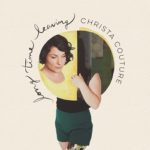 It’s hard to reconcile the fourth Christa Couture album with its accompanying press release; if you’ve read about her personal history and you know that this is a break-up album, then you could be forgiven for expecting Leonard Cohen meets Jackson Browne, but “Long Time Leaving” certainly doesn’t fit that mould. Lyrically, it’s a very honest portrayal of a breakup, tapping in to all aspects of the end of a relationship, including the opportunities for experimentation presented to the newly-uncoupled. Even when a song’s subject matter’s dark, the musical arrangements can be quite upbeat, even jaunty, with an eclectic mix of musical stylings and a clear, intimate vocal hinting at early Joni Mitchell and Tori Amos.
It’s hard to reconcile the fourth Christa Couture album with its accompanying press release; if you’ve read about her personal history and you know that this is a break-up album, then you could be forgiven for expecting Leonard Cohen meets Jackson Browne, but “Long Time Leaving” certainly doesn’t fit that mould. Lyrically, it’s a very honest portrayal of a breakup, tapping in to all aspects of the end of a relationship, including the opportunities for experimentation presented to the newly-uncoupled. Even when a song’s subject matter’s dark, the musical arrangements can be quite upbeat, even jaunty, with an eclectic mix of musical stylings and a clear, intimate vocal hinting at early Joni Mitchell and Tori Amos.
The musicianship is superb throughout the album; Gary Craig (drums) and John Dymond (basses) along with producer Steve Dawson (guitars and keys) with a guest appearance from renowned Nashville fiddler Fats Kaplin, shift seamlessly from style to style as they build an evocative backdrop for Christa’s vocals. “Zookeeper” is a perfect example of this; the arrangement builds around a heavily reverbed guitar to create a dramatic, doom-laden setting for a song portraying a couple’s counsellor as a zookeeper forcing them to face up to the wild animals that symbolise the reasons for their breakup.
“Alone in This” is pure Nashville, with pedal steel throughout, topped off with a beautiful solo, while “Lovely Like You” bounces along with help of Fats Kaplin’s fiddle fills and the call and response between fiddle, vocals and slide resonator. These are all elements that you wouldn’t be surprised to find on any Americana record, but there’s a joker in the pack as well. There are occasional flashes of musical theatre breaking through in the instrumental arrangements and the vocal delivery. In the lines ‘The hallways are lined with boxes neatly stacked/this is what eight years looks like packed’ that open “Separation/Agreement”, there’s a one-beat pause before ‘packed’ that’s pure theatre, and it’s perfect.
“Long Time Leaving” pulls together widely varying musical styles linked by Christa Couture’s fluty voice, inventive lyrics and tales of the aftermath of a breakup. One of her aims was to make an album to accompany doing housework and she’s actually managed to make it work. With a few exceptions, the music is catchy, packed with hooks and upbeat, while Christa avoids the obvious pitfalls of the subject matter by steering clear of the blame culture and exploring areas like binge drinking and sexual experimentation. It’s an intriguing roller-coaster of an album and when you step off at the end of the ride, you’ll feel exhilarated and uplifted. You’ll probably get through the ironing twice as quickly as well.
“Long Time Leaving” is released on Black Hen Music (BHCD0079) on Friday May 20th.
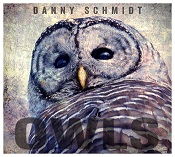 It might seem like a really obvious statement but this album is all about the songs. What it isn’t about is overblown production techniques, flashy solos or drums like cannons. It’s a group of musicians playing live in the studio, trying to get to the heart of eleven songs without bludgeoning the songs into submission. Danny Schmidt is a songwriter from Austin, Texas who fits perfectly into the seventies singer-songwriter mould (often used as a lazy comparison, but this time it’s absolutely spot on) with hints of Leonard Cohen, Neil Young and perhaps even Jackson Browne. On “Owls” (his seventh studio album), his band of Mike Meadows (drums), Andrew Pressman (bass), David Goodrich (electric guitars), Lloyd Maines (lap steel) and Carrie Elkins and Daniel Thomas Phipps (backing vocals) provide a backdrop that ranges from the ethereal, Mexican-accented “Girl with Lantern Eyes” through the Dylan-era Band of “The Guns and the Crazy Ones” to the moody, foreboding and doom-laden “Paper Cranes”. There’s even a bit of a rock ‘n’ roll flavour to the environmental anthem “Soon the Earth Shall Swallow”.
It might seem like a really obvious statement but this album is all about the songs. What it isn’t about is overblown production techniques, flashy solos or drums like cannons. It’s a group of musicians playing live in the studio, trying to get to the heart of eleven songs without bludgeoning the songs into submission. Danny Schmidt is a songwriter from Austin, Texas who fits perfectly into the seventies singer-songwriter mould (often used as a lazy comparison, but this time it’s absolutely spot on) with hints of Leonard Cohen, Neil Young and perhaps even Jackson Browne. On “Owls” (his seventh studio album), his band of Mike Meadows (drums), Andrew Pressman (bass), David Goodrich (electric guitars), Lloyd Maines (lap steel) and Carrie Elkins and Daniel Thomas Phipps (backing vocals) provide a backdrop that ranges from the ethereal, Mexican-accented “Girl with Lantern Eyes” through the Dylan-era Band of “The Guns and the Crazy Ones” to the moody, foreboding and doom-laden “Paper Cranes”. There’s even a bit of a rock ‘n’ roll flavour to the environmental anthem “Soon the Earth Shall Swallow”.
Lyrically, “Owls” is an album that’s worth digging into because not everything reveals itself at the first listen; Danny Schmidt makes extensive use of parable, metaphor and intricate rhyming schemes in his quest to convey his insights, which range from the political concerns of “The Guns and the Crazy Ones” and “Soon the Earth will Swallow” to the very personal “Girl with Lantern Eyes” and “Cry on the Flowers”. These songs will make you sad and make you angry; they might even make you think.
And this is where we get to the really subjective bit. While Danny’s fragile tenor works really well most of the time, conveying emotion and fragility, there are times when the vibrato becomes a distraction from rather than an enhancement to the song. I know some of you might like this, and I’m not saying you’re wrong, but it’s a bit overdone for my taste. Otherwise it’s a bunch of great songs on interesting lyrical themes played tastefully by a great band providing frameworks which enhance the power of the songs.
Out Monday May 18 on Live Once Records (LORCD09).
So it’s time to move on to the second half of the seventies and the early eighties and we start off with the P-word.
AM – How did you react when punk came along then?
PB – Loved it; I actually loved it and weirdly I wanted it to do what it wanted to do because up to that point my heroes were not punk at all and the very antithesis of punk. I wanted it, because I would have been about seventeen then, leaving school, and just starting to think about playing music in pubs and got a band together; well, actually, I got a duet together with Martin Gore (yes, that Martin Gore) and we were trying to write songs. He liked, I don’t know who he liked, I think it was Simon and Garfunkel at the time and he did like Sparks and David Bowie. I liked David Bowie but I wasn’t sure, I didn’t trust him which now, I think, was probably wrong, but I didn’t get the idea that superficial and chameleon-like was his theme. At the time I thought ‘I don’t believe he really means this’ and at that time it had to mean it and that meant a lot to me and I was probably wrong and Gore was probably way ahead of me on that. So we wrote songs which I tried to make melodic and soulful and he wanted to make strange and weird. I taught him how to play guitar and he was a better guitar player than he is, well, what he’s ended up as. We were writing some interesting songs at the time and we went out as this strange band and the punk happened, halfway through this band.
I had hair like Marc Bolan at the time and he had a bubble-cut but we found ourselves on these punk bills. I’d started writing a few songs as well, so I found myself as a solo person on these punk bills for no reason whatsoever because I had nothing to do with punk musically but I liked the fact you could play somewhere and there was energy there and I started listening to other people who were playing and I thought I’ll have a listen to this, so I went along to see some bands. I saw The Buzzcocks, The Ramones and The Talking Heads when they first came over, I saw The Clash once and there was a big fight so I didn’t hear much of The Clash, but that wasn’t the point in a way. I tended to like a what went on afterwards in the post-punk era; I got really well into that because there seemed to be room for bands like Television and The Fall with some of their lyrics which, at that point, were suddenly taking over for me and I went from trying to write songs like James Taylor with three words in them to two chords and “War and Peace” over the top of them; “Ulysses” or something like that, but then there were bands that that was feeding into at the time like The Fall. I certainly got heavily into The Fall and the more experimental bands but I would still listen to “The Modern Dance” by Pere Ubu and then go home and listen to “Mud Slide Slim and the Blue Horizon” by James Taylor because I think that’s what it’s about; they’re not dissimilar in the sense that the person who’s responsible for the music does what he wants it to do. There’s too many categories, in a way.
AM – I know Television, “Marquee Moon”, everybody claims now that it’s always been their favourite album and at the time…
PB – They’re fucking lying; I tried to get everyone into that and a couple of people got it, but for once the rabid NME press was right about this.
AM – For me it’s still one that I’m happy to get the vinyl copy out and stick it on the turntable.
PB – It is actually an album I can listen to at any time and that’s a rare thing. Sometimes, even your favourite albums you think ‘I’m not in the mood for that’, but I can be depressed, I can be happy, I can be whatever, but when Television comes on, that’s it.
AM – So, that was punk, what about what came after that.
PB – Punk was exciting and I was involved in the energy of it; everywhere you went there were gigs. I sounded like Leonard Cohen at that time but anything went and that was the beauty of it. I wore flares and had long hair at the punk gigs I did and it was, sort of, ok. You’d get comments, but that was sort of the point; wait until Dexys Midnight Runners sing about ‘you’re so anti-fashion, wear flares”. You could do anything you liked, it was sort of Dadaist spirit. It was very early on when the fashion thing kicked in, the Kings Road punks, and it was weird because I felt like I’d transcended that because I hadn’t changed. I didn’t even cut my hair so I was like David Crosby amongst the punks.
AM – So presumably when the synthesisers kicked in that wouldn’t really have been your thing.
PB – When the post-punk thing happened, I used to like some of the bands that became known as Krautrock, Can, Neu and the newer ones as well, Deutsch Amerikanische Freundschaft and Einsturzende Neubauten who were pure noise and distortion and the English versions of that like Cabaret Voltaire; I loved all of that. I thought there’s a synth thing going on and Martin got into it, so he buggered off and did Depeche Mode. Suddenly it turned into this really twee pop with no substance. I don’t hate pop music but I thought, with everything he knew, and the stuff he liked, I thought he would have gone towards Throbbing Gristle rather than this thing that happened, which seemed like it was going to be over in five minutes. For all I know he’s now a multi-millionaire and I’m sitting in a pub in Leigh.
AM – It’s a general thing that innovations like that come along, people make really good music and then somebody grabs bits of it for the mainstream and just dilutes it.
PB – That’s always happened. Bob Dylan wouldn’t have been anywhere if it wasn’t for The Byrds; fabulous as that was, I’d rather hear Dylan. I’m probably alone in the world in preferring “All Along the Watchtower” by Bob Dylan to the Hendrix version, even though I like Jimi Hendrix. I’m alone, even Bob Dylan said it’s a better version.
AM – Dylan’s songs have been interpreted by a lot of people; are they better versions or are they different versions?
PB – They’re different versions. Sometimes you can say they’re better versions but the thing I always try to get away from is ‘Dylan’s a fabulous songwriter and an icon of the twentieth century but he can’t sing’. So that means that if Judy Collins or some such does a version of “Idiot Wind”, it will be better, de facto, because she can sing. I could not disagree with anything, outside of UKIP, more vehemently than that. Bob Dylan and Sinatra are probably the best vocal stylists of this millennium. The reason I say that is because you try to play a Bob Dylan song and sing it and not sing a bit like Bob Dylan, not phrase it like him. The same with Sinatra, once you’ve heard “You Make me Feel So Young”, you try and sing that differently. Put your own slant on that; you can’t.
AM – I play and sing badly but I try Dylan songs like “I Shall be Released” and it’s always going to sound like Dylan.
PB – The Band did that; they’ve got some great singers in that band, and it sounded like Dylan; they couldn’t change the phrasing at all. You can sing it in a bland way or you can over-sing it; my worst nightmare is that I’ll wake up and “Positively Fourth Street” is covered by Mariah Carey. She would do it and you can guarantee you would have a queue of people saying ‘Oh, at last this song has been realised by a true singer’, but I would hunt her down and you’d see me on the Six O’Clock News if that happened.


